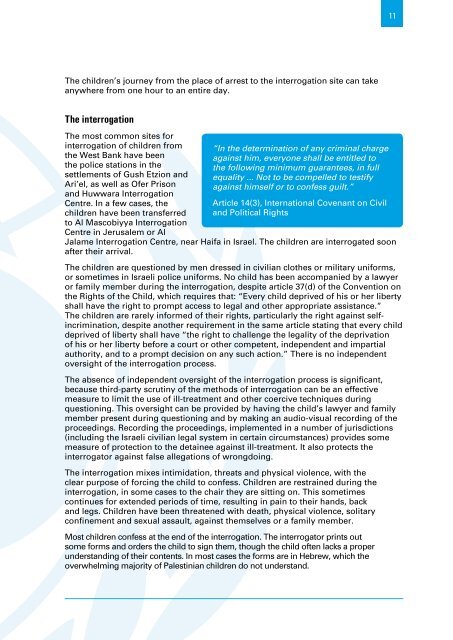Children in israeli Military detention
Children in israeli Military detention
Children in israeli Military detention
You also want an ePaper? Increase the reach of your titles
YUMPU automatically turns print PDFs into web optimized ePapers that Google loves.
The children’s journey from the place of arrest to the <strong>in</strong>terrogation site can take<br />
anywhere from one hour to an entire day.<br />
the <strong>in</strong>terrogation<br />
The most common sites for<br />
<strong>in</strong>terrogation of children from<br />
the West Bank have been<br />
the police stations <strong>in</strong> the<br />
settlements of Gush Etzion and<br />
Ari’el, as well as Ofer Prison<br />
and Huwwara Interrogation<br />
Centre. In a few cases, the<br />
children have been transferred<br />
to Al Mascobiyya Interrogation<br />
Centre <strong>in</strong> Jerusalem or Al<br />
“In the determ<strong>in</strong>ation of any crim<strong>in</strong>al charge<br />
aga<strong>in</strong>st him, everyone shall be entitled to<br />
the follow<strong>in</strong>g m<strong>in</strong>imum guarantees, <strong>in</strong> full<br />
equality ... Not to be compelled to testify<br />
aga<strong>in</strong>st himself or to confess guilt.”<br />
Article 14(3), International Covenant on Civil<br />
and Political Rights<br />
Jalame Interrogation Centre, near Haifa <strong>in</strong> Israel. The children are <strong>in</strong>terrogated soon<br />
after their arrival.<br />
The children are questioned by men dressed <strong>in</strong> civilian clothes or military uniforms,<br />
or sometimes <strong>in</strong> Israeli police uniforms. No child has been accompanied by a lawyer<br />
or family member dur<strong>in</strong>g the <strong>in</strong>terrogation, despite article 37(d) of the Convention on<br />
the Rights of the Child, which requires that: “Every child deprived of his or her liberty<br />
shall have the right to prompt access to legal and other appropriate assistance.”<br />
The children are rarely <strong>in</strong>formed of their rights, particularly the right aga<strong>in</strong>st self<strong>in</strong>crim<strong>in</strong>ation,<br />
despite another requirement <strong>in</strong> the same article stat<strong>in</strong>g that every child<br />
deprived of liberty shall have “the right to challenge the legality of the deprivation<br />
of his or her liberty before a court or other competent, <strong>in</strong>dependent and impartial<br />
authority, and to a prompt decision on any such action.” There is no <strong>in</strong>dependent<br />
oversight of the <strong>in</strong>terrogation process.<br />
The absence of <strong>in</strong>dependent oversight of the <strong>in</strong>terrogation process is significant,<br />
because third-party scrut<strong>in</strong>y of the methods of <strong>in</strong>terrogation can be an effective<br />
measure to limit the use of ill-treatment and other coercive techniques dur<strong>in</strong>g<br />
question<strong>in</strong>g. This oversight can be provided by hav<strong>in</strong>g the child’s lawyer and family<br />
member present dur<strong>in</strong>g question<strong>in</strong>g and by mak<strong>in</strong>g an audio-visual record<strong>in</strong>g of the<br />
proceed<strong>in</strong>gs. Record<strong>in</strong>g the proceed<strong>in</strong>gs, implemented <strong>in</strong> a number of jurisdictions<br />
(<strong>in</strong>clud<strong>in</strong>g the Israeli civilian legal system <strong>in</strong> certa<strong>in</strong> circumstances) provides some<br />
measure of protection to the deta<strong>in</strong>ee aga<strong>in</strong>st ill-treatment. It also protects the<br />
<strong>in</strong>terrogator aga<strong>in</strong>st false allegations of wrongdo<strong>in</strong>g.<br />
The <strong>in</strong>terrogation mixes <strong>in</strong>timidation, threats and physical violence, with the<br />
clear purpose of forc<strong>in</strong>g the child to confess. <strong>Children</strong> are restra<strong>in</strong>ed dur<strong>in</strong>g the<br />
<strong>in</strong>terrogation, <strong>in</strong> some cases to the chair they are sitt<strong>in</strong>g on. This sometimes<br />
cont<strong>in</strong>ues for extended periods of time, result<strong>in</strong>g <strong>in</strong> pa<strong>in</strong> to their hands, back<br />
and legs. <strong>Children</strong> have been threatened with death, physical violence, solitary<br />
conf<strong>in</strong>ement and sexual assault, aga<strong>in</strong>st themselves or a family member.<br />
Most children confess at the end of the <strong>in</strong>terrogation. The <strong>in</strong>terrogator pr<strong>in</strong>ts out<br />
some forms and orders the child to sign them, though the child often lacks a proper<br />
understand<strong>in</strong>g of their contents. In most cases the forms are <strong>in</strong> Hebrew, which the<br />
overwhelm<strong>in</strong>g majority of Palest<strong>in</strong>ian children do not understand.<br />
11


